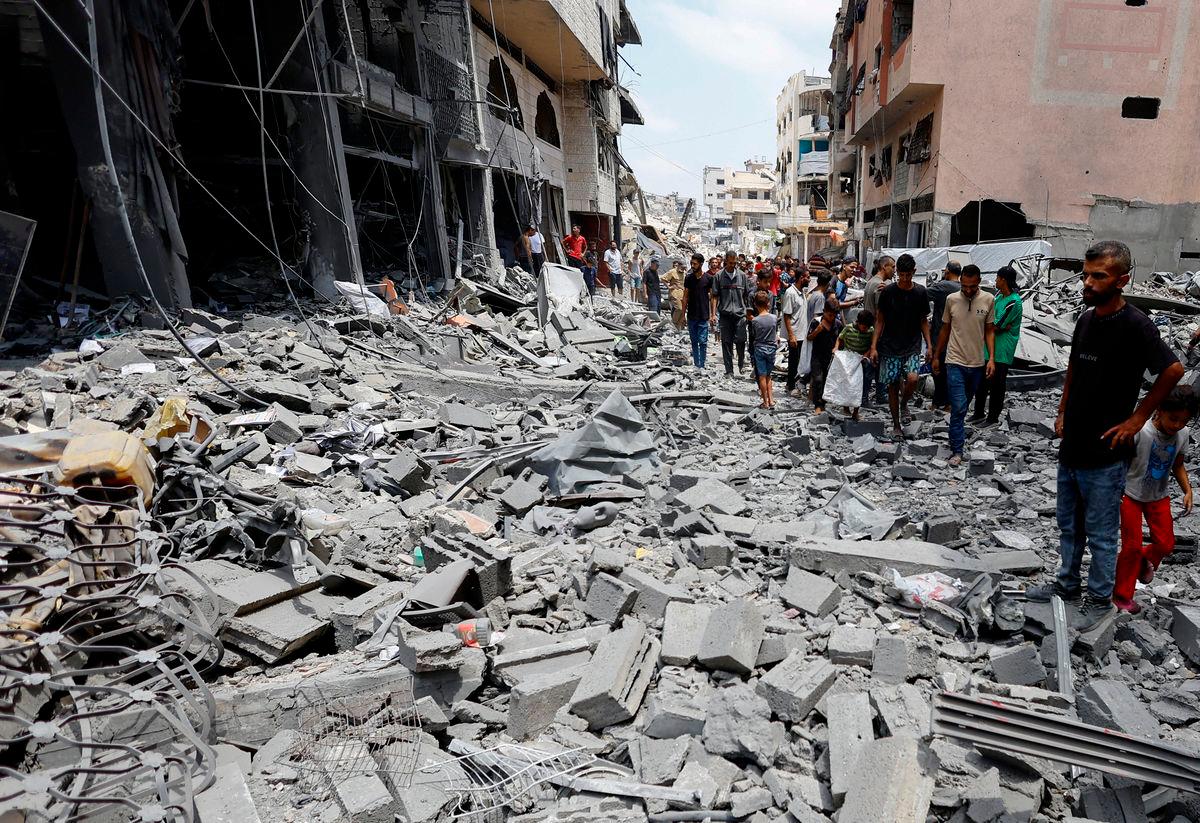JERUSALEM: Israel's security cabinet approved a plan on Friday to take control of Gaza City, a move expanding military operations in the shattered Palestinian territory despite growing criticism at home and abroad over the almost two-year-old war.
Far-right allies in Prime Minister Benjamin Netanyahu's coalition have been pushing for a total takeover of Gaza as part of his vow to eradicate Hamas militants, though the military has warned this could endanger the lives of remaining hostages held by the group.
Israel, at war in Gaza since Hamas' deadly attack on southern Israel in October 2023, is planning the expanded campaign after failed attempts to mediate a ceasefire and as it faces a rising international outcry over a deepening humanitarian disaster.
Netanyahu’s office said in a statement the military “will prepare to take control of Gaza City while providing humanitarian aid to the civilian population outside the combat zones”.
While Netanyahu said on Thursday Israel intended to take military control of the entire Gaza Strip, the plan approved on Friday focused specifically on sprawling Gaza City, the territory's largest urban centre, located in its north.
In a statement, Hamas called Netanyahu’s moves “a blatant coup” against the negotiation process.
Israel's cabinet is expected to endorse the Gaza City plan.
Israeli media have said 900,000 people now live in Gaza City, which has been the focus of major ground and air attacks. They include many of those who were forced to leave towns in the northern edge of the enclave under army evacuation orders and ground operations.
Before the war, Hamas' most powerful fighting units were believed to operate in northern Gaza, including Gaza City. It is not clear if that is still the case because Israel has killed the group's top leaders and many of its commanders and militants.
Asked if Israel, whose forces say they already hold about 75% of the coastal strip, would occupy all of it, Netanyahu told Fox News Channel’s Bill Hemmer in an interview on Thursday: “We intend to.”
He said Israel did not want to keep the territory, but to establish a “security perimeter” and to hand over the territory to Arab forces to govern it. He did not elaborate on the governance arrangements or which Arab countries could be involved.
Netanyahu, who has said there will be no end to the war until Hamas is completely destroyed, has come under pressure from Israelis to do whatever it takes to bring home hostages held by the militant group, though many want the war to stop.
“Well, basically, I think it’s a death sentence to all the hostages that are still being held there. And it’s the wrong decision to do it at this time,“ said Danny Bukovsky, a hotelier in Tel Aviv.
There are 50 hostages still held in Gaza, of whom Israeli officials believe 20 are alive. Most of those freed so far emerged as a result of diplomatic negotiations. Talks toward a ceasefire that could have seen more hostages released collapsed in July.
Amjad Iraqi, senior analyst at International Crisis Group, said that Israel’s government believes the solution is to “be more aggressive in carving Gaza’s geography and demographics” because it has faced no real consequences despite an international outcry.
“It’s no wonder Israel is ready to do the same to the strip’s de facto capital, even amid a spiral into famine,“ said Iraqi.
A global hunger monitor has said a famine scenario is unfolding in densely populated Gaza, where nearly all the territory's more than 2 million people have been displaced, often repeatedly.
Phased take-over
Among the scenarios considered ahead of the security meeting was a phased takeover of areas in Gaza not yet under military control, a government source said, speaking on condition of anonymity.
Evacuation warnings could be issued to Palestinians in specific areas of Gaza, potentially giving them several weeks before the military moves in, the person added.
In its statement on Friday, Netanyahu’s office said the vast majority of the security cabinet believed that “the alternative plan presented in the cabinet would not achieve the defeat of Hamas nor the return of the hostages”.
“It just doesn’t seem like there’s any clear plan moving forward. So unless there’s a clear plan, we should end the war, bring the hostages home and stop so many soldiers from dying”, said Tel Aviv university student Talya Saltzman.
A full occupation of Gaza would reverse a 2005 decision in which Israel withdrew thousands of Jewish settlers and its forces, while retaining control over its borders, airspace and utilities.
It was unclear whether Netanyahu was foreseeing a prolonged takeover or a short-term operation.
In a statement, Hamas called the approval of plans to occupy Gaza City and displace its residents “a new war crime”.
Israel has rejected accusations of war crimes and genocide as it pursues the military campaign. Last month, two leading Israeli rights groups accused Israel of committing genocide against Palestinians in Gaza.
Arab countries will “only support what Palestinians agree and decide on,“ a Jordanian official source told Reuters, adding that security in Gaza should be handled through “legitimate Palestinian institutions”.
Netanyahu's government has ruled out a return to Gaza of the Western-backed Palestinian Authority, which exercises limited autonomy in parts of the Israeli-occupied West Bank under 1990s interim peace accords.
Hamas insists any deal must lead to a permanent end to the war. Israel says the group has no intention of fulfilling promises to give up power afterwards - REUTERS









